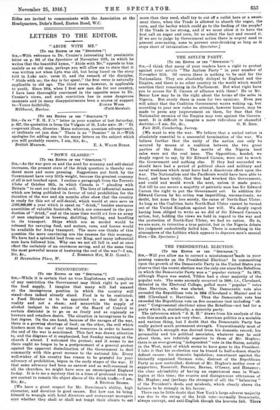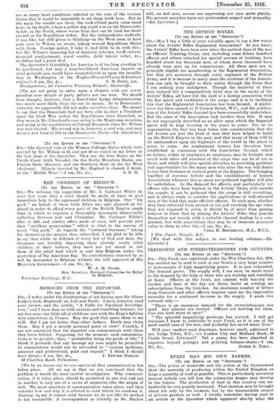THE PRESIDENTIAL ELECTION.
(To ens EDITOR OF THE " SPECTLT011."3
BM—Will you allow me to correct a miestatementSnade in your passing remarks on the Presidential Election? In commenting upon the growth of the Democratic Party in the United States you observe that the recent election was the only one since the Rebellion in which the Democratic Party won a " popular victory." In 1876, although Hayes was seated, Tilden had a clear majority of the popular vote. The same anomaly occurred in 1888; i.e., Cleveland, defeated in the Electoral College, polled more " popular " votes than Harrison, who was elected. The Democratic vote also exceeded the Republican vote in 1884 (Cleveland v. Blaine) and in 1892 (Cleveland v. Harrison). Thus the Democratic vote has exceeded the Republican vote on five occasions (not including " off- year " Congressional elections) since the Rebellion—not bad for a party which is, statistically, a minority party.
The inferences which " S. R. H." draws from his analysis of the vote this month are not very clear. American politics is a mutable and various thing, but I doubt that the Democratic Party has really gained much permanent strength. Unquestionably most of Mr. Wilson's strength was derived from his dementia record; his personality and his political associates, whatever may be said about them, are infinitely superior to those of Mr. Hughes; there is an ever-growing "independent" vote in the States, notably in the West, most of which seems to have gone to the President. I take it that his re-election can be traced to half-a-dozen clearly defined causes : his domestic legislation; resentment against the blatantly organized German vote; distrust of the Republican Party as now controlled; distrust of Mr. Hughes's motley crew of supporters, Roosevelt, Penrose, Barnes, O'Leary, and Hexamer; the clear advisability of having an experienced man in Wash- ington at this time; the evasive and disingenuous utterances of Mr. Hughes; and (perhaps the strongest of all) the " balancing " of the President's deeds and misdeeds, which clearly shows the balance to be strongly in his favour.
There can be little doubt that New York's large adverse majority was due to the swing of the Irish vote—normally Democratic, always corrupt, and anti-English though the heavens fall. There
are so many local conditions reflected in the vote of the various States that it would be impossible to set them forth here. But in the main the results are clear; the rock-ribbed party votes stood firm; in the South, where a yellow dog could win on the Democratic ticket; in the North, where worse than that can be (and has been) elected on the Republican ticket. But the independents—radicals, -if you like, but still given to thinking—in the West seem to have gone over to Wilson en mane, taking several Republican States with them. Foreign policy, I take it, had little to do with this; but Mr. Wilson's imposing list of domestic reforms, tariff reform, financial readjustment, rural credits, child labour relief, &c., doubtless had a great deal.
The Spectator's friendship for America is of too long standing to be questioned; but may a long-bewildered American inquire on what grounds you would have congratulated us upon the installa- tion at Washington of the Hughes-Hearst-O'Leary-Schweitzer
[We are not going to enter upon a dispute with our corre- spondent over details of party politics not our own. We should have thought, however, that a Root-Cabot Lodge Administration was much more likely than the one he names. As to Democratic victories, we apparently did not make ourselves clear. We meant to say that the Democrats had not been able to elect a President since the Civil War unless the Republicans were disunited, as they were in Mr.-Cleveland's case owing to the Mugwump secession, and owing to the candidature of Colonel Roosevelt when Dr. Wilson was first elected. His second win is, however, a real win, and may mean a new lease of life to the Democratic Party.—ED. Spectator.]



































 Previous page
Previous page